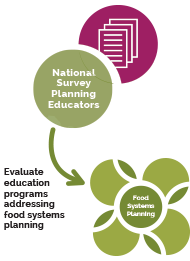Growing Food Connections is nurturing the next generation of food systems leaders, thinkers, and scholars to tackle food systems through planning and policy. GFC is supporting faculty and students to teach and learn about food systems planning.
While community residents and planners grapple with the conditions of food systems in their communities, professional planning education on food systems continues to lag. As late as 2004, only nine programs in the United States offered, or had offered in the past, “a course that addressed community food systems—either as a standalone course or embedded in a regular course (Hammer 2004),” with the University of Wisconsin-Madison playing a pioneering role by training both masters and doctoral students in this area. Although more planning programs now offer graduate-level food systems courses, even today food systems planning remains a stranger to contemporary professional planning education. This limited attention to food systems is a failing of contemporary planning education, as few graduates enter the workforce trained in this area of growing demand. In a 2007-2008 survey of APA members, about 70% of respondents noted food to be an area of significant priority for the planning profession. Yet only about 30% reported that their organizations were actively involved in food systems planning. When queried about the barriers that limit their organizations and agencies’ to engage in food issues, a majority (51%) of respondents cited the lack of staff trained in food systems planning (Raja, Born et al. 2008). Clearly, there is a significant opportunity for planning programs in the United States to fill the demand for planning education in food systems. GFC is helping planning educators meet this demand. Specifically, GFC is conducting a survey of planning educators in order to understand the state of food systems planning education. In addition, GFC is developing sample course syllabi and curricula for adoption by 10 partner universities throughout the United States.

